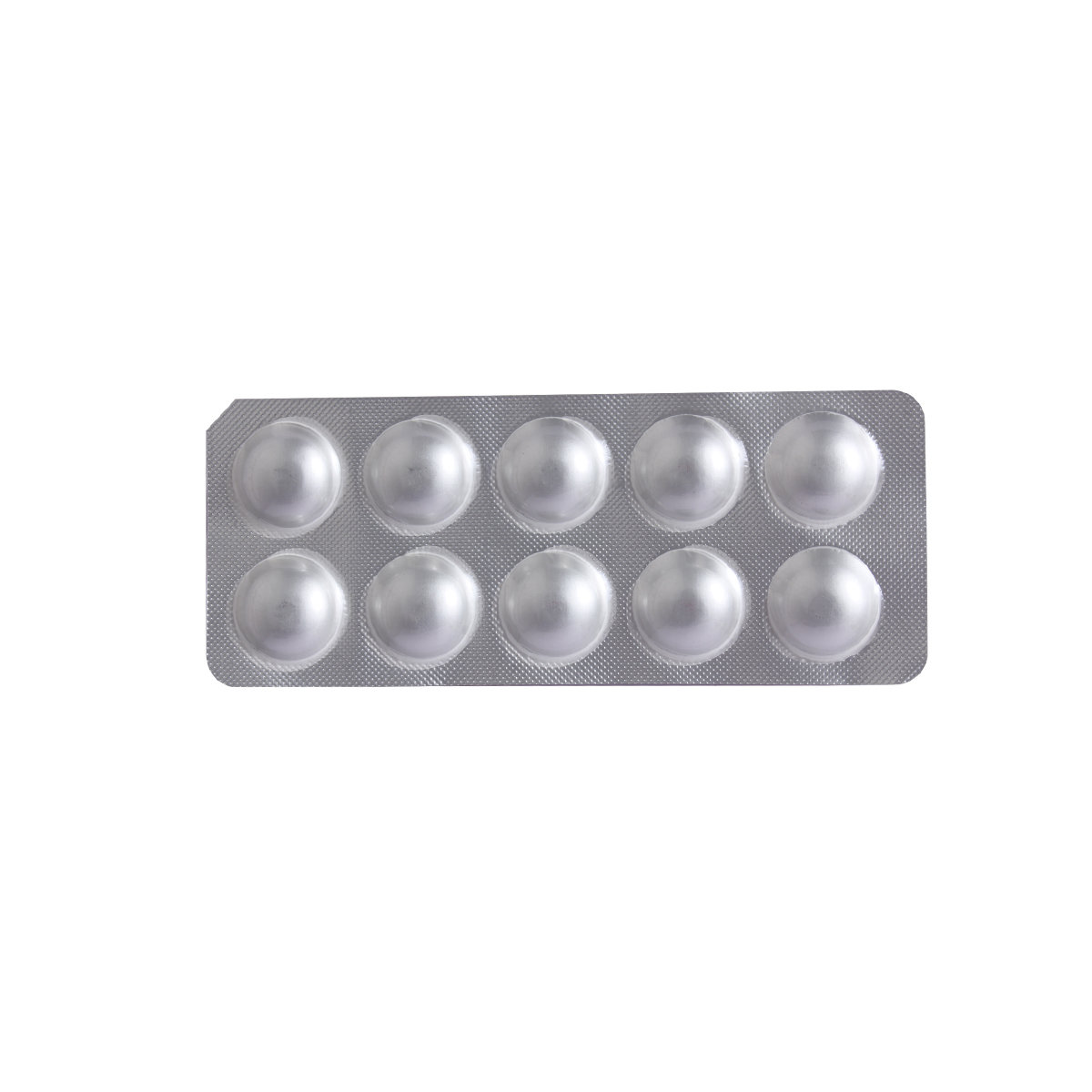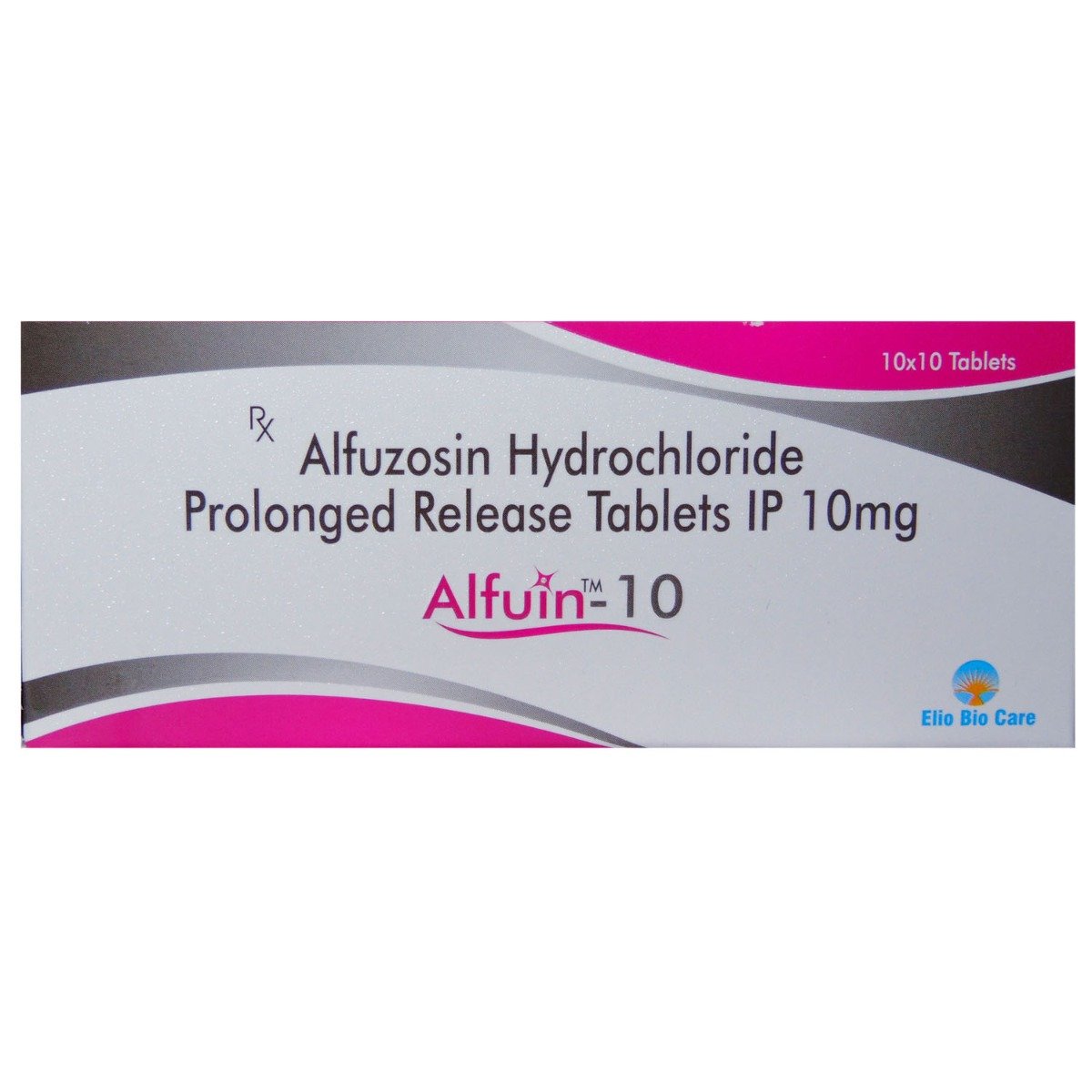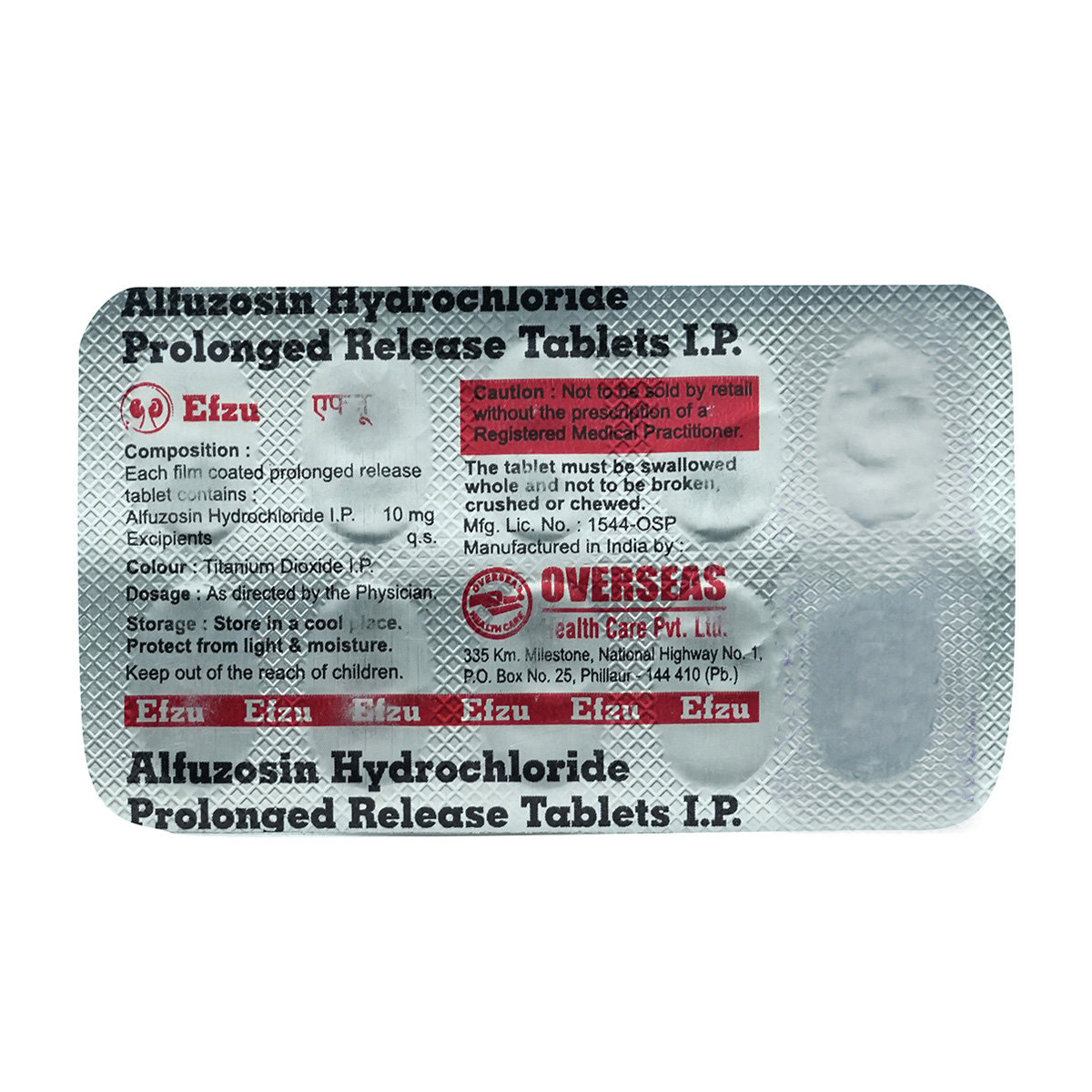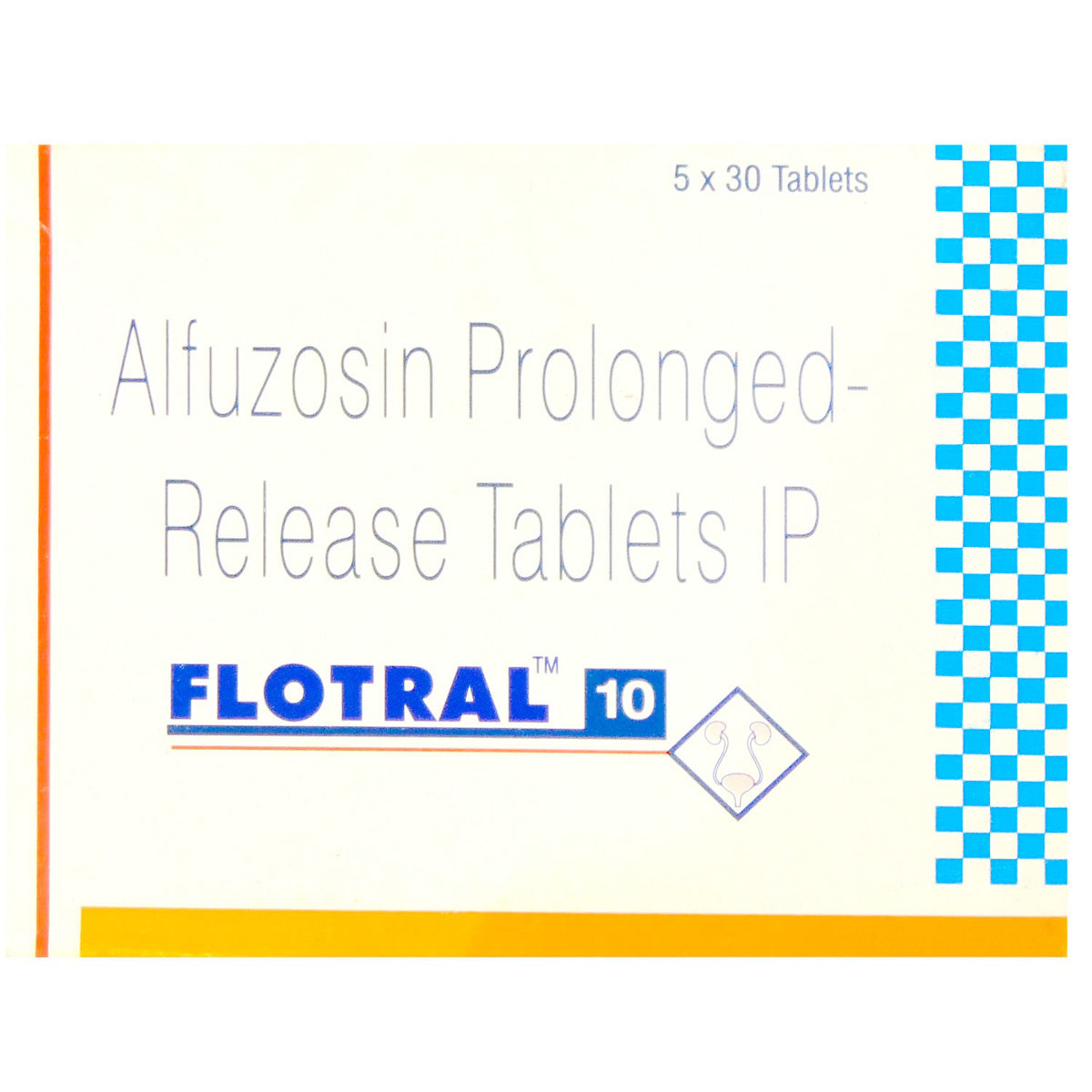ZYALFA TABLET


MRP ₹1064
(Inclusive of all Taxes)
₹127.7 Cashback (12%)
Provide Delivery Location
Online payment accepted
 Prescription drug
Prescription drugWhats That
Composition :
Manufacturer/Marketer :
Consume Type :
Expires on or after :
Return Policy :
About ZYALFA TABLET
ZYALFA TABLET belongs to the group of medicines called alpha-blockers used to treat the symptoms of benign prostatic hypertrophy. Benign prostatic hyperplasia occurs due to non-cancerous enlargement of the prostate gland due to the multiplication of the cells. Benign prostatic hypertrophy/hyperplasia mostly occurs in older men.
ZYALFA TABLET contains ‘Alfuzosin’ that works by blocking the receptors (alpha 1) on the prostate gland, bladder and urethra (urine pipe). ZYALFA TABLET relaxes the muscles of the bladder and prostate; this reduces the narrowing of the urethra. Thereby, helps in relieving the symptoms of benign prostatic hyperplasia and makes it easier to pass urine.
You are advised to take ZYALFA TABLET for as long as your doctor has prescribed it for you, depending on your medical condition. In some cases, you may experience certain common side-effects such as dizziness, nausea, vomiting, diarrhoea, stomach pain, headache, and dry mouth. Most of these side-effects do not require medical attention and will resolve gradually over time. However, you are advised to talk to your doctor if you experience these side-effects persistently.
Rise slowly from a sitting/lying position as ZYALFA TABLET may cause dizziness or weakness. ZYALFA TABLET is intended for use in men only; women should not take ZYALFA TABLET, especially pregnant or breastfeeding women. ZYALFA TABLET should not be given to children as safety and efficacy have not been established. ZYALFA TABLET may cause dizziness, so drive with caution. Avoid or limit alcohol consumption with ZYALFA TABLET as it could lead to increased dizziness. Inform your doctor about your health condition and medications before taking ZYALFA TABLET to rule out any side-effects.
Uses of ZYALFA TABLET
Directions for Use
Key Benefits
ZYALFA TABLET belongs to the group of medicines called alpha-blockers. ZYALFA TABLET is used to treat the symptoms of an enlarged prostate (benign prostatic hyperplasia) in men. ZYALFA TABLET relieves the symptoms of benign prostatic hyperplasia by blocking the receptors (alpha 1) on the prostate gland, bladder and urethra (urine pipe). ZYALFA TABLET works by relaxing the muscles of the bladder and prostate; this reduces the narrowing of the urethra. Thereby, helps in relieving the symptoms of benign prostatic hyperplasia and makes it easier to pass urine. ZYALFA TABLET is used to treat symptoms of benign prostatic hyperplasia such as painful urination, difficulty in urination, excess urination, incomplete urination, leakage of urine, dribbling at the end of the urinary stream, and urgency in urination.
Storage
- Inform your doctor about the symptoms you're experiencing due to medication.
- Your doctor may adjust your treatment plan, which could include changing your medication, adding new medications, or offering advice on managing your symptoms.
- Practice good hygiene, including frequent handwashing, avoiding close contact with others, and avoiding sharing utensils or personal items.
- Stay hydrated by drinking plenty of fluids to help loosen and clear mucus from your nose, throat, and airways.
- Get plenty of rest and engage in stress-reducing activities to help your body recover. If your symptoms don't subside or worsen, consult your doctor for further guidance.
- Apply a hot/cold pack to the affected area.
- Doing gentle exercises can help cope with pain by stretching muscles.
- Get enough sleep. It helps enhance mood and lower pain sensitivity.
- Avoid alcohol, smoking and tobacco as they can increase pain.
- Follow a well-balanced meal.
- Meditation and massages may also help with pain.
- Drink water or other clear fluids.
- To prevent worsening of pain, limit intake of tea, coffee, or alcohol.
- Include bland foods like rice, toast, crackers, and rice in your diet.
- Avoid lying down immediately after eating as it may cause indigestion or heartburn.
- Avoid acidic and spicy food as it may cause indigestion.
- Take medications with food (if recommended): It can help prevent stomach distress and indigestion.
- Eat smaller, more frequent meals: Divide daily food intake into smaller, more frequent meals to ease digestion.
- Avoid trigger foods: Identify and avoid foods that trigger indigestion, such as spicy, fatty, or acidic foods.
- Stay upright after eating: Sit or stand upright for at least 1-2 hours after eating to prevent stomach acid from flowing into the oesophagus.
- Avoid carbonated drinks: Avoid drinking carbonated beverages, such as soda or beer, which can worsen indigestion.
- Manage stress: To alleviate indigestion, engage in stress-reducing activities like deep breathing exercises or meditation.
- Consult a doctor if needed: If indigestion worsens or persists, consult a healthcare professional to adjust the medication regimen or explore alternative treatments.
- Inform your doctor about your constipation symptoms. They may adjust your medication or advise alternative treatments.
- Stay hydrated by drinking sufficient of water (at least 8-10 glasses a day) to help soften stool and promote bowel movements.
- Increase fibre intake by eating foods high in fibre, such as fruits, whole grains, vegetables and legumes, to help bulk up the stool.
- Establish a bowel routine by trying to go to the bathroom at the same time each day to train your bowels.
- Engaging in regular exercise, like walking or yoga, can support in bowel movement stimulation.
- Consult your doctor if constipation persists, and discuss alternative treatments or adjustments to your medication.
- Inform your doctor about the nausea and discuss possible alternatives to the medication or adjustments to the dosage.
- Divide your daily food intake into smaller, more frequent meals to reduce nausea.
- Opt for bland, easily digestible foods like crackers, toast, plain rice, bananas, and applesauce.
- Avoid certain foods that can trigger nausea, such as fatty, greasy, spicy, and smelly foods.
- Drink plenty of fluids, such as water, clear broth, or electrolyte-rich beverages like coconut water or sports drinks.
- Use ginger (tea, ale, or candies) to help relieve nausea.
- Get adequate rest and also avoid strenuous activities that can worsen nausea.
- Talk to your doctor about taking anti-nausea medication if your nausea is severe.
- Record when your nausea occurs, what triggers it, and what provides relief to help you identify patterns and manage your symptoms more effectively.
- Quit smoking as smoking impairs erectile function by significantly damaging blood vessels.
- Maintain a healthy weight as overweight can cause erectile dysfunction.
- Exercise regularly as physical activity enhances blood flow and overall health, benefiting erectile function.
- Consume a healthy diet loaded with whole grains, fruits and vegetables.
- Limit alcohol consumption as excessive alcohol intake can impair erectile function.
- Manage stress by practicing techniques such as yoga, relaxation exercises or meditation.
- In case erectile dysfunction is due to psychological factors, consider couple counselling or sex therapy to address relationship and anxiety issues.
- Openly discuss your concerns with your partner.
Drug Warnings
Do not take ZYALFA TABLET if you are allergic to any of its contents; if you are taking any other alpha-blockers; if you have postural hypotension or severe liver problems. Inform your doctor if you have angina, urinary tract infections or crystals in the formed water, high blood pressure, circulatory problems, heart problems; if you are due to undergo any surgery that requires anaesthesia; if you are older than 65years or if you get painful erections before or during the treatment that will not go away. Talk to your doctor before taking ZYALFA TABLET if you are undergoing eye surgery. ZYALFA TABLET is intended for use in men only; women should not take ZYALFA TABLET, especially pregnant or breastfeeding women. ZYALFA TABLET should not be given to children as safety and efficacy have not been established. ZYALFA TABLET may cause dizziness, so drive with caution. Avoid or limit alcohol consumption with ZYALFA TABLET as it could lead to increased dizziness. Rise slowly from a sitting/lying position as ZYALFA TABLET can cause dizziness or weakness.
Drug-Drug Interactions
Drug-Drug Interactions
Login/Sign Up
When Zyalfa Tablet and Tipranavir are taken together, the body's ability to break down Zyalfa Tablet may be reduced. This increases the risk and severity of side effects.
How to manage the interaction:
Taking Zyalfa Tablet with Tipranavir is not recommended as it can possibly result in an interaction. It should be taken only when advised by a doctor. However, if you experience symptoms like severe dizziness, fainting, fast/irregular heartbeat, chest pain, fast or irregular heartbeat, nausea, or sweating contact a doctor immediately. Do not discontinue any medications without consulting a doctor.
Taking Zyalfa Tablet with halofantrine can increase the risk or severity of irregular heart rhythms. The risk increases in patients with a history of heart illness or electrolyte imbalance.
How to manage the interaction:
Taking Zyalfa Tablet and halofantrine together is generally avoided as it can result in an interaction. It can be taken if your doctor has advised it. However, if you experience sudden dizziness, lightheadedness, fainting, shortness of breath, chest pain or tightness, or a rapid heartbeat, contact your doctor immediately. Do not discontinue any medications without consulting a doctor.
Taking Telaprevir with Zyalfa Tablet can increase the blood levels and effects of Zyalfa Tablet. This can increase the risk or severity of low blood pressure.
How to manage the interaction:
Taking Telaprevir with Zyalfa Tablet is not recommended as it can possibly result in an interaction, it can be taken only if your doctor has advised it. However, if you experience sudden dizziness, lightheadedness, fainting, shortness of breath, chest pain or tightness, rapid heartbeat, or memory loss, contact your doctor immediately. Do not discontinue any medications without consulting a doctor.
When Zyalfa Tablet and Clarithromycin can increase the risk or severity of side effects like low blood pressure or irregular heart rates.
How to manage the interaction:
Taking clarithromycin with Zyalfa Tablet is not recommended as it can result in an interaction; it should be taken only if your doctor has advised it. However, if you experience dizziness, headache, palpitations, or chest discomfort, contact your doctor immediately. Do not discontinue any medications without consulting a doctor.
Using Zyalfa Tablet together with voriconazole may significantly increase the blood levels and effects of Zyalfa Tablet.
How to manage the interaction:
Taking Voriconazole with Zyalfa Tablet is not recommended, please consult a doctor before taking it. Call a doctor if you experience dizziness, headache, nasal congestion, or heart palpitation. Do not stop using any medications without talking to a doctor.
Taking Zyalfa Tablet with Thioridazine can increase the risk or severity of irregular heart rhythms. The risk increases in patients with a history of heart illness or electrolyte imbalance.
How to manage the interaction:
Taking Zyalfa Tablet with Thioridazine together can possibly result in an interaction, it can be taken if your doctor has advised it. However, if you experience sudden dizziness, lightheadedness, fainting, shortness of breath, chest pain or tightness, rapid heartbeat, or memory loss, contact a doctor immediately. Do not discontinue any medications without consulting a doctor.
When Idelalisib is taken with Zyalfa Tablet, it can lower the metabolism of Zyalfa Tablet. This can increase the risk or severity of side effects like low blood pressure.
How to manage the interaction:
Taking Zyalfa Tablet with Idelalisib is not recommended as it can possibly result in an interaction, it should be taken only if your doctor has advised it. However, if you experience dizziness, lightheadedness, fainting, headache, flushing, nasal congestion, heart palpitation, and priapism (prolonged and painful erection), contact your doctor immediately. Do not discontinue any medications without consulting a doctor.
Concomitant use of Zyalfa Tablet with Atazanavir can increase the risk of low blood pressure.
How to manage the interaction:
Coadministration of Zyalfa Tablet with Atazanavir is not recommended, however, it can be taken if your doctor has advised it. Contact your doctor immediately if you experience dizziness, palpitations, difficulty swallowing, or sweating. It is recommended to monitor your blood pressure regularly. Do not discontinue any medications without first consulting your doctor.
Coadministration of Dronedarone with Zyalfa Tablet can increase the risk or severity of irregular heart rhythms. The risk increases in patients with a history of heart illness or electrolyte imbalance.
How to manage the interaction:
Taking Dronedarone with Zyalfa Tablet together is not recommended, as it leads to an interaction, it can be taken if your doctor has advised it. However, if you experience dizziness, shortness of breath, chest discomfort, or palpitations, contact your doctor immediately. Do not discontinue any medications without consulting a doctor.
Coadministration of Zyalfa Tablet and ceritinib can increase the risk of developing side effects.
How to manage the interaction:
Taking Ceritinib with Zyalfa Tablet is not recommended as it can result in an interaction; it should be taken only if your doctor has advised it. However, if you experience dizziness, headache, palpitations, contact your doctor immediately. Do not discontinue any medications without consulting a doctor.
Drug-Food Interactions
Drug-Food Interactions
Login/Sign Up
Diet & Lifestyle Advise
- Urinate as soon as you feel the urge.
- Avoid excess caffeine and alcohol consumption.
- Maintain a healthy diet and exercise regularly.
- Practice kegel exercises to strengthen pelvic muscles.
- Reduce stress levels by doing yoga or meditation. Nervousness can increase the frequency of urination.
Side Effects of ZYALFA TABLET
- Dizziness
- Nausea
- Vomiting
- Diarrhoea
- Stomach pain
- Headache
- Dry mouth
Habit Forming
Therapeutic Class
All Substitutes & Brand Comparisons
RX
Out of StockAlfufast Tablet 10's
Leeford Healthcare Ltd
₹60
(₹6.0 per unit)
93% CHEAPERRX
Out of StockDrusoin 10mg Tablet
Drukst Biotech Pvt Ltd
₹96
(₹8.64 per unit)
90% CHEAPERRX
Alfman 10 mg Tablet 10's
Hetero Drugs Ltd
₹114
(₹10.26 per unit)
89% CHEAPER
Product Substitutes
Author Details
We provide you with authentic, trustworthy and relevant information
Drug-Diseases Interactions
Drug-Diseases Interactions
Login/Sign Up
FAQs
ZYALFA TABLET works by relaxing the muscles of the bladder and prostate; this reduces the narrowing of the urethra. Thereby, helps in relieving the symptoms of benign prostatic hyperplasia and making it easier to pass urine.
Dry mouth could be a side-effect of ZYALFA TABLET. Limiting caffeine intake, avoiding smoking and mouthwashes containing alcohol, drinking water regularly and chewing sugar-free gum/candy might help in stimulating saliva and thereby prevents drying of the mouth.
Diarrhoea might be a side-effect of ZYALFA TABLET. Drink lots of fluids and eat non-spicy food if you experience diarrhoea. If you find blood in stools (tarry stools) or if you experience severe diarrhoea, consult your doctor. Do not take anti-diarrheal medicine on your own.
Orthostatic hypotension, also known as postural hypotension, could be a side-effect of ZYALFA TABLET. Postural hypotension is a sudden lowering in blood pressure leading to dizziness on standing. If you experience this, do not try to stand up suddenly or start walking, instead, lie down and get up slowly only when you feel better.
Talk to your doctor before taking ZYALFA TABLET with anti-fungal medicines such as ketoconazole and itraconazole, and antiretroviral medicines such as ritonavir as they might increase the blood levels of ZYALFA TABLET.
Prostatic carcinoma is the cancer of the prostate gland, whereas benign prostatic hyperplasia is the non-cancerous growth of the prostate. Prostatic carcinoma and benign prostatic hyperplasia may have the same symptoms. Therefore, people with benign prostatic hyperplasia should be examined prior to starting the treatment with ZYALFA TABLET to rule out the presence of carcinoma of the prostate.
If you are due to have or are undergoing cataract surgery, inform the doctor that you are taking ZYALFA TABLET. This will help the doctor to manage the complications in advance, which could occur during the surgery.
Consult your doctor before taking ZYALFA TABLET with nitrates. Taking ZYALFA TABLET with medicines used to treat angina/chest pain, such as nitrates (nitroglycerin, glyceryl trinitrate) may cause severe lowering of blood pressure.
Drug-Drug Interactions Checker List
- TADALAFIL
- SILDENAFIL
- METOPROLOL
- KETOCONAZOLE
- ITRACONAZOLE
- RITONAVIR
- GLYCERYL TRINITRATE
- CLARITHROMYCIN
- TELITHROMYCIN
- NEFAZODONE
Special Advise
- Regular monitoring of blood pressure is advised while taking ZYALFA TABLET, especially at the beginning of the treatment.
- If you are due to have any surgery that requires a general anaesthetic, inform your doctor that you are taking ZYALFA TABLET. Your doctor may advise you to stop taking ZYALFA TABLET 24hours prior to the surgery to prevent lowering of blood pressure.
Disease/Condition Glossary
Benign prostatic hyperplasia: The prostate is a small, muscular gland in the male reproductive system which surrounds the urethra. Benign prostatic hyperplasia occurs due to non-cancerous enlargement of the prostate gland due to the multiplication of the cells. Benign prostatic hypertrophy/hyperplasia mostly occurs in older men. This causes the prostate gland to swell, which leads to the squeezing of the urethra and limits the urine flow. The symptoms of benign prostatic hyperplasia include painful urination, difficulty in urination, excess urination, incomplete urination, leakage of urine, dribbling at the end of the urinary stream, and urgency in urination. An enlarged prostate is a normal condition of men ageing due to changes in male sex hormones.

Have a query?
Buy best Genito Urinary products by
Cipla Ltd
Sun Pharmaceutical Industries Ltd
Intas Pharmaceuticals Ltd
Ipca Laboratories Ltd
Leeford Healthcare Ltd
Dr Reddy's Laboratories Ltd
Lupin Ltd
Alkem Laboratories Ltd
Msn Laboratories Pvt Ltd
Zydus Healthcare Ltd
Demorbus India Pvt Ltd
Mankind Pharma Pvt Ltd
Overseas Health Care Pvt Ltd
RPG Life Sciences Ltd
La Renon Healthcare Pvt Ltd
Alembic Pharmaceuticals Ltd
Corona Remedies Pvt Ltd
Macleods Pharmaceuticals Ltd
Aristo Pharmaceuticals Pvt Ltd
Fourrts India Laboratories Pvt Ltd
Tas Med India Pvt Ltd
Micro Labs Ltd
Samarth Life Sciences Pvt Ltd
Zydus Cadila
Emcure Pharmaceuticals Ltd
Hetero Drugs Ltd
Ignyx Pharmaceuticals
Renspur Healthcare Pvt Ltd
Steris Healthcare
Alniche Life Sciences Pvt Ltd
Septalyst Lifesciences Pvt Ltd
Ajanta Pharma Ltd
Elder Pharmaceuticals Ltd
Merynova Life Sciences India Pvt Ltd
Tppl Pharmaceuticals Pvt Ltd
Walter Bushnell
Aar Ess Remedies Pvt Ltd
Knoll Healthcare Pvt Ltd
Lividus Pharmaceuticals Pvt Ltd
Meditrex Pharma
Medrhans Pharmaceuticals Pvt Ltd
Neuten HealthCare
Redmed Medical Services
Talohsty Medmark Pvt Ltd
Zycris Healthcare
East West Pharma India Pvt Ltd
Globus Remedies Ltd
Golden Square Lab Pvt Ltd
Hetero Healthcare Pvt Ltd
Modi Mundipharma Pvt Ltd
Nephurocare Pharma Pvt Ltd
Pfizer Ltd
TTK Healthcare Ltd
Votary Laboratories (India) Ltd
Albus Healthcare Pvt Ltd
Delvin Formulations (P) Ltd
Indoco Remedies Ltd
Intra Life Pvt Ltd
Megma Healthcare Pvt Ltd
Morepen Laboratories Ltd
Qren Life Sciences Pvt Ltd
Steadfast MediShield Pvt Ltd
Unipark Biotech Pvt Ltd
Akumentis Healthcare Ltd
Biokindle Lifesciences Pvt Ltd
Calren Care Lifesciences Pvt Ltd
Chemo Biological Ltd
Chemo Healthcare Pvt Ltd
Euniche Life Sciences
Himeros Pharmaceuticals Pvt Ltd
Hospimax Healthcare Pvt Ltd
Kiosence Health Care Pvt Ltd
Lia Life Sciences Pvt Ltd
Panacea Biotec Ltd
Primus Remedies Pvt Ltd
Rencord Life Sciences Pvt Ltd
Shilpa Medicare Ltd
Stadmed Pvt Ltd
Abbott India Ltd
Ameya Pharmaceuticals & Chemicals Pvt Ltd
Ardent Life Sciences Pvt Ltd
Asterima Pharmaceuticals Pvt Ltd
Astrum Healthcare Pvt Ltd
Cadila Healthcare Ltd
De Renon
Fibovil Pharmaceuticals Pvt Ltd
Koye Pharmaceuticals Pvt Ltd
Linux Laboratories Pvt Ltd
MMC Healthcare Ltd
Neovae Biomedics Pvt Ltd
Olcare Laboratories Pvt Ltd
Oxygen Pharma Care Pvt Ltd
Prevego Healthcare & Research Pvt Ltd
Rene Lifescience
Sanzyme Pvt Ltd
Solis Ortus Remedies Pvt Ltd
Syndicate Life Sciences Pvt Ltd
Tycoon Pharmaceuticals Pvt Ltd
Vasu Organics Pvt Ltd
Walron Health Care Pvt Ltd
Alcohol
Safe if prescribed
You are recommended to avoid or limit alcohol consumption while taking ZYALFA TABLET as it may cause increased dizziness.
Pregnancy
Consult your doctor
ZYALFA TABLET belongs to pregnancy category B. ZYALFA TABLET is intended for use in men only; women should not take ZYALFA TABLET, especially pregnant women.
Breast Feeding
Consult your doctor
ZYALFA TABLET is intended for use in men only; women should not take ZYALFA TABLET.
Driving
Safe if prescribed
ZYALFA TABLET may cause dizziness. Do not drive or operate machinery unless you are alert.
Liver
Consult your doctor
ZYALFA TABLET should not be used if you have moderate to severe liver impairment. The safety of ZYALFA TABLET in patients with mild hepatic impairment has not been established. Please consult your doctor if you have a liver impairment or any concerns regarding this.
Kidney
Consult your doctor
Dose adjustment may be necessary. Please consult your doctor if you have kidney impairment or any concerns regarding this.
Children
Safe if prescribed
ZYALFA TABLET should not be given to children as safety and efficacy have not been established.












_0.jpg?tr=q-85)

